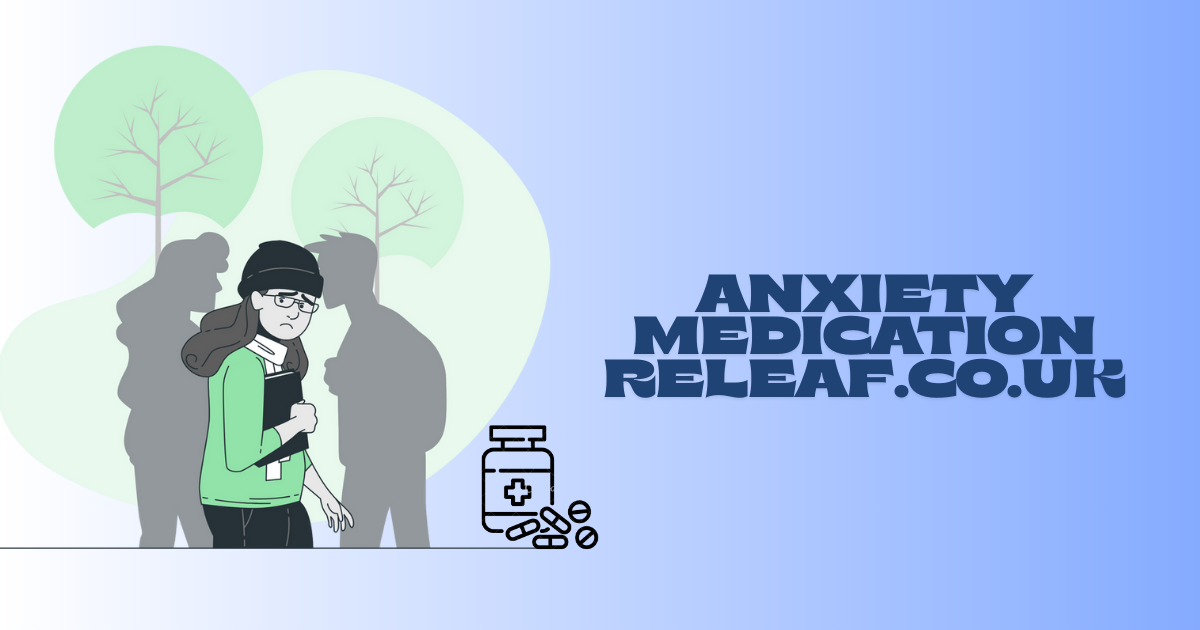What is Anxiety and Why Does it Affect Daily Life?
Anxiety is more than just occasional worry—it is a persistent condition that can affect thoughts, emotions, and physical health. Many people experience symptoms such as rapid heartbeat, restlessness, difficulty concentrating, and feelings of dread. When anxiety becomes overwhelming, it can interfere with work, relationships, and overall well-being, making treatment options essential for recovery.
Research shows that anxiety disorders are among the most common mental health conditions worldwide. Without proper management, anxiety can lead to chronic stress, sleep problems, and even physical health complications. Understanding the root causes and available treatments is the first step toward regaining control of your life.
Types of Anxiety Disorders That May Require Medication
There are different forms of anxiety disorders, and each may respond differently to treatment. Generalized Anxiety Disorder (GAD) causes excessive worry about everyday life, while Panic Disorder triggers sudden episodes of intense fear. Other conditions include Social Anxiety Disorder, where individuals fear social situations, and specific phobias, where irrational fears dominate behavior.
Because each type has unique symptoms, doctors may recommend different medications or treatment plans. For example, someone with panic attacks may need fast-acting medication, while a person with chronic worry may benefit from long-term solutions. Knowing your specific diagnosis helps in finding the right balance of therapy and medication.
The Role of Medication in Treating Anxiety
Medication can help regulate the chemicals in the brain that influence mood and stress responses. Selective serotonin reuptake inhibitors (SSRIs) are among the most commonly prescribed options, as they increase serotonin levels and improve emotional stability. Other treatments may include benzodiazepines, beta-blockers, or serotonin-norepinephrine reuptake inhibitors (SNRIs).
Not everyone requires medication, but for those with severe or long-lasting symptoms, it can be life-changing. Combined with therapy, healthy lifestyle habits, and stress management, anxiety medication often brings relief and allows people to function more normally in daily life.
Benefits of Using Medication for Anxiety Relief
One of the biggest benefits of anxiety medication is its ability to reduce overwhelming symptoms quickly and effectively. Patients often report improved sleep, better concentration, and less physical tension. For individuals who have been struggling for years, this relief can feel like getting their life back.
Medication also allows people to engage more fully in therapy and lifestyle changes. Without the heavy burden of constant worry, patients find it easier to adopt healthier routines, build stronger relationships, and regain confidence. These combined benefits make medication a valuable part of a comprehensive treatment plan.
Potential Side Effects and Considerations
Like any treatment, anxiety medications come with possible side effects. Common issues include fatigue, dizziness, headaches, or digestive problems. While these are often temporary, some people may experience stronger effects depending on their body chemistry and the type of medication prescribed.
Doctors usually monitor patients closely during the early stages of treatment. Adjusting dosages or switching medications can help minimize side effects. Open communication with healthcare providers ensures that individuals find the best option with the least disruption to daily life.
Combining Therapy with Medication
Experts often recommend combining therapy with medication for the most effective results. Cognitive Behavioral Therapy (CBT) is one of the most popular methods, teaching patients how to reframe negative thoughts and manage stress. When paired with medication, therapy often leads to long-term improvements in mental health.
This approach works well because medication eases symptoms, while therapy addresses the underlying thought patterns and triggers. Together, they provide both immediate relief and sustainable coping strategies, making recovery more achievable.
Natural Alternatives and Lifestyle Support
In addition to medication, many people explore natural remedies such as herbal supplements, meditation, or breathing exercises. Practices like yoga, mindfulness, and regular exercise are proven to lower stress and support emotional stability. A balanced diet and adequate sleep also play crucial roles in reducing anxiety symptoms.
While natural remedies may not replace medication entirely, they can be powerful companions to traditional treatment. Patients often find that blending modern medicine with lifestyle support creates a more holistic path to recovery.
Finding Reliable Sources for Anxiety Medication
When seeking treatment, it is important to choose safe and trustworthy sources. Prescription medications should always be obtained through licensed healthcare providers and legitimate pharmacies. Online platforms can also offer helpful information, but they must be reputable and regulated.
For example, resources such as anxiety medication releaf.co.uk provide useful guidance for those exploring their options. By choosing reliable providers, individuals ensure they receive high-quality medication and professional support tailored to their needs.
Talking to Your Doctor About Anxiety Medication
A key step in starting medication is having an open discussion with your doctor. Be prepared to explain your symptoms, medical history, and any concerns about side effects. The more information you share, the better your doctor can match you with an appropriate treatment.
Doctors may also recommend blood tests or evaluations to rule out other conditions. This careful approach ensures that you receive the right dosage and type of medication while reducing the risks associated with self-diagnosis or misuse.
Long-Term Management of Anxiety Disorders
Anxiety is often a long-term condition, but it can be successfully managed with the right approach. Many patients continue medication for months or years, while others transition to therapy and lifestyle changes over time. The goal is not just to treat symptoms but to build resilience and confidence.
Support systems also play a crucial role in long-term recovery. Family, friends, and support groups provide encouragement, while regular check-ins with healthcare providers ensure progress is monitored. With consistent care, individuals can lead fulfilling, balanced lives despite their anxiety disorder.
Conclusion
Anxiety is a complex condition, but effective treatments are available to help individuals find relief and regain control. Medication, when combined with therapy and healthy lifestyle choices, offers powerful support in overcoming the challenges of anxiety. By understanding the options, seeking reliable providers, and working closely with medical professionals, long-term recovery becomes a realistic goal.
If you are struggling with anxiety, know that solutions exist. With the right plan, it is possible to manage symptoms, improve daily life, and move forward with confidence.





